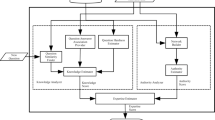Abstract
Expertise recommenders that help in tracing expertise rather than documents start to apply some advanced information retrieval techniques. This paper introduces an odds ratio model to model expert entities for expert finding. This model applies odds ratio instead of raw probability to use language modeling techniques. A raw language model that uses prior probability for smoothing has a tendency to boost up “common” experts. In such a model the score of a candidate expert increases as its prior probability increases. Therefore, the system would trend to suggest people who have relatively large prior probabilities but not the real experts. While in the odds ratio model, such a tendency is avoided by applying an inverse ratio of the prior probability to accommodate “common” experts. The experiments on TREC test collections shows the odds ratio model improves the performance remarkably.
Preview
Unable to display preview. Download preview PDF.
Similar content being viewed by others
References
Balog, K., Azzopardi, L., de Rijke, M.: Formal models for expert finding in enterprise corpora. In: Proceedings of the 29th Annual International ACM SIGIR Conference on Research and Development in Information Retrieval, pp. 43–50 (2006)
Cao, Y., Li, H., Liu, J., Bao, S.: Research on expert search at enterprise track of TREC 2005. In: Proceedings of the Fourteenth Text REtrieval Conference (TREC 2005) (2005)
Craswell, N., de Vries, A.P., Soboroff, I.: Overview of the TREC 2005 enterprise track. In: Proceedings of the Fourteenth Text REtrieval Conference (TREC 2005) (2005)
McDonald, D.W.: Recommending expertise in an organizational setting. In: Conference on Human Factors in Computing Systems, pp. 63–64 (1999)
McDonald, D.W., Ackerman, M.S.: Expertise recommender: A flexible recommendation and architecture. In: Proceedings of the 2000 ACM Conference on Computer Supported Cooperative Work (CSCW 2000) (2000)
Ponte, J.M., Croft, W.B.: A language modeling approach to information retrieval. In: Proceedings of the 21st Annual International ACM SIGIR Conference on Research and Development in Information Retrieval, pp. 275–281 (1998)
Ru, Z., Chen, Y., Xu, W., Guo, J.: TREC 2005 enterprise track experiments at BUPT. In: Proceedings of the Fourteenth Text REtrieval Conference (TREC 2005) (2005)
Soboroff, I., de Vries, A.P., Craswell, N.: Overview of the TREC 2006 enterprise track. In: Proceedings of the Fifteenth Text REtrieval Conference (TREC 2006) (2006)
The Lemur toolkit for language modeling and information retrieval. http://www.lemurproject.org/
Yimam, D., Kobsa, A.: Centralization vs. decentralization issues in internet-based knowledge management systems: experiences from expert recommender systems. In: Workshop on Organizational and Technical Issues in the Tension Between Centralized and Decentralized Applications on the Internet (TWIST 2000) (2000)
Yimam, D., Kobsa, A.: DEMOIR: A hybrid architecture for expertise modeling and recommender systems. In: Proceedings of the IEEE 9th International Workshops on Enabling Technologies: Infrastructures for Collaborative Enterprises, pp. 67–74 (2000)
Zhai, C., Lafferty, J.: A study of smoothing methods for language models applied to ad hoc information retrieval. In: 24th ACM SIGIR Conference on Research and Development in Information Retrieval (SIGIR 2001), pp. 334–342 (2001)
Zhai, C., Lafferty, J.: The dual role of smoothing in the language modeling approach. In: Proceedings of the Workshop on Language Models for Information Retrieval (LMIR), pp. 31–36 (2001)
Author information
Authors and Affiliations
Editor information
Rights and permissions
Copyright information
© 2008 Springer-Verlag Berlin Heidelberg
About this paper
Cite this paper
Ru, Z., Guo, J., Xu, W. (2008). Improving Expertise Recommender Systems by Odds Ratio. In: Li, H., Liu, T., Ma, WY., Sakai, T., Wong, KF., Zhou, G. (eds) Information Retrieval Technology. AIRS 2008. Lecture Notes in Computer Science, vol 4993. Springer, Berlin, Heidelberg. https://doi.org/10.1007/978-3-540-68636-1_1
Download citation
DOI: https://doi.org/10.1007/978-3-540-68636-1_1
Publisher Name: Springer, Berlin, Heidelberg
Print ISBN: 978-3-540-68633-0
Online ISBN: 978-3-540-68636-1
eBook Packages: Computer ScienceComputer Science (R0)




